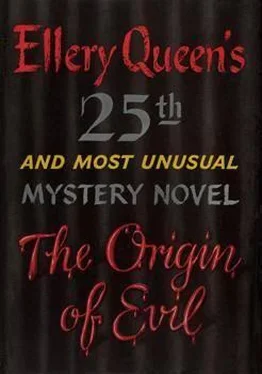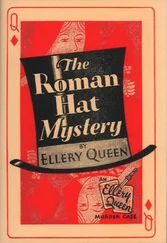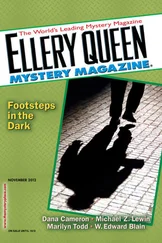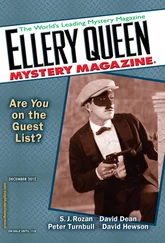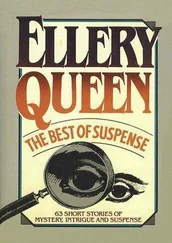“A moment ago,” said Ellery, “I mentioned Adam’s sense of humor. I wonder if you see the point, Mr. Priam. Where his joke is heading.”
‘What?” said Priam in a mumble.
“All his warnings to you have had not one, but two, things in common. Not only has each warning involved an animal ― but each animal was dead.”
Priam’s head jerked.
“His first warning was a dead lamprey. His second warning was a dead fish. His third consisted of dead frogs and toads. The next a dead alligator. The next ― The Birds ― a little symbolism here, because he mutilated and destroyed the book... the only way in which you can physically ‘kill’ a book! Even his last warning ― the ‘cats and dogs’ ― connotes death; there’s nothing quite so ‘dead’ as the stock of a company that has folded up. Really a humorist, this Adam.
“Right up the ladder of evolution ― from the lowest order of vertebrates, the lamprey, to one of the highest, cats and dogs. And every one, in fact or by symbol, was delivered dead.
“But Mr. Priam, Adam isn’t finished.” Ellery leaned forward. “He hasn’t climbed Darwin’s ladder to stop at the next-to-the-last rung. The top rung of that ladder is still to be put in evidence. The highest creature in the class of Mammalia.
“So it’s perfectly certain that there’s an exhibit yet to come, the last exhibit, and by inference from the preceding ones, a dead exhibit. Charles Lyell Adam is going to produce a dead man, Mr. Priam, and there wouldn’t be much point to his Darwinian joke if that dead man weren’t Roger Priam.”
Priam remained absolutely motionless.
“We’ve gone all over this,” said Lieutenant Keats sharply, “and we agree there’s only one thing to do. You’re tagged for murder, Priam, and it’s going to come soon ― tomorrow, maybe tonight, maybe an hour from now. I’ve got to have you alive, Priam, and I want Adam alive, too, if possible, because the law likes us to bring ‘em back that way. You’re going to have to be guarded night and day, starting right now. A man in this room. One on the terrace there. A couple around the grounds―”
Roger Priam filled his chest.
A roar came out that set the crystals in the chandelier jangling.
“Criminal, am I? On what evidence?” He brandished a clublike forefinger at Lieutenant Keats. “I’m not admitting a thing, you can’t prove a thing, and I ain’t asking for your protection or taking it! ― d’ye get me?”
“What are you afraid of?” jeered the detective. “That we will lay our hands on Adam?”
“I’ve always fought my own scraps and, by God, I’ll fight this one!”
“From a wheelchair?”
“From a wheelchair! Now get out of my house, you, and stay out!”
They stayed out. Anyone from the outside would have said they were finished with Roger Priam and all his works. Daily Lieutenant Keats might have been seen going about his business; daily Ellery might have been seen staring at his — a blank sheet of paper in a still typewriter — or at night dining alone, with an ear cocked, or afterwards hovering above the telephone. He rarely left the cottage during the day; at night, never. His consumption of cigarets, pipe tobacco, coffee, and alcohol gave Mrs. Williams a second subject for her interminable monologues; she alternated between predictions of sudden death for the world and creeping ulcers for Ellery.
At one time or another Laurel, Crowe Macgowan, Alfred Wallace, Collier ― even Delia Priam ― phoned or called in person, either unsolicited or by invitation. But each hung up or went away as worried or perplexed or thoughtful as he had been; and if Ellery unburdened himself to any of them, or vice versa, nothing seemed to come of it.
And Ellery lit another cigaret, or tormented another pipe, or gulped more hot coffee, or punished another highball, and Mrs. Williams’s wails kept assailing the kitchen ceiling.
Then, one humid night at the beginning of the fourth week in July, just after midnight, the call came for which Ellery was waiting.
He listened, he said a few words, he broke the connection, and he called the number of Keats’s house.
Keats answered on the first ring.
“Queen?”
“Yes. As fast as you can.”
Ellery immediately hung up and ran out to his car. He had parked the Kaiser at the front door every night for a week.
He left it on the road near the Priam mailbox. Keats’s car was already there. Ellery made his way along the bordering grass to the side of the house. He used no flashlight. In the shadow of the terrace a hand touched his arm.
“Quick.” Keats’s whisper was an inch from his ear.
The house was dark, but a faint night light was burning in Roger Priam’s room off the terrace. The French door was open, and the terrace was in darkness.
They got down on their knees, peered through the screening of the inner door.
Priam’s wheelchair was in its bed position, made up for the night. He lay on his back, motionless, beard jutting obliquely to the ceiling.
Nothing happened for several minutes.
Then there was the slightest metallic sound.
The night light was in an electric outlet in the wainscoting near the door which led into the hall. They saw the doorknob clearly; it was in motion. When it stopped, the door began to open. It creaked. Came to rest.
Priam did not move.
The door opened swiftly.
But the night light was beyond the doorway and when the door swung back to the farther wall it cut off most of the slight glow. All they could make out from the terrace was a formless blackness deeper than the darkness at the rear of the room. This gap in the void moved steadily from the doorway to Roger Priam’s chair-bed. A tentacular something projected before it. The projection swam into the outermost edge of the night light’s orbit and they saw that it was a revolver.
Beside Priam’s chair the moving blackness halted.
The revolver came up a little.
Keats stirred. It was more a tightening of his muscles than a true movement; still, Ellery’s fingers clamped on the detective’s arm.
Keats froze.
And then the whole room exploded, motion gone wild.
Priam’s arm flashed upward and his great hand closed like the jaws of a reptile on the wrist of the hand that held the revolver. The crippled man heaved his bulk upright, bellowing. There was the blurriest of struggles; they looked like two squids locked in battle at the bottom of the sea.
Then there was a soggy report, a smart thud, and quiet.
When Ellery snapped the wall switch Keats was already on his knees by the figure on the floor. It lay in a curl, almost comfortably, one arm hidden and the other outstretched. At the end of the outstretched arm lay the revolver.
“Chest,” Keats muttered.
Roger Priam was glaring at the two men.
“It’s Adam,” he said hoarsely. “Where did you two come from? He came to kill me. It’s Adam. I told you I could handle him!” He laughed with his teeth, but at once he began to shake, and he squinted at the fallen figure and rubbed his eyes with a trembling hand. “Who is he? Let me see him!”
“It’s Alfred.”
“Alfred?” The beard drooped.
Keats rose to go around Priam’s chair. He plucked one of Priam’s telephones from its hook and dialed a number.
“Alfred is Adam?” Priam sounded dazed, stupid. He recoiled quickly, but it was only Ellery removing his top blanket.
Ellery dropped the blanket over the thing on the floor.
“He’s...?” Priam’s tongue came out. “Is he dead?”
“Headquarters?” said Keats. “Keats, Hollywood Division, reporting a homicide. The Hill-Priam case. Roger Priam just shot Alfred Wallace, his secretary-nurse-what-have-you, shot him to death... That’s right. Through the heart. I witnessed the shooting myself, from the terrace―”
Читать дальше
